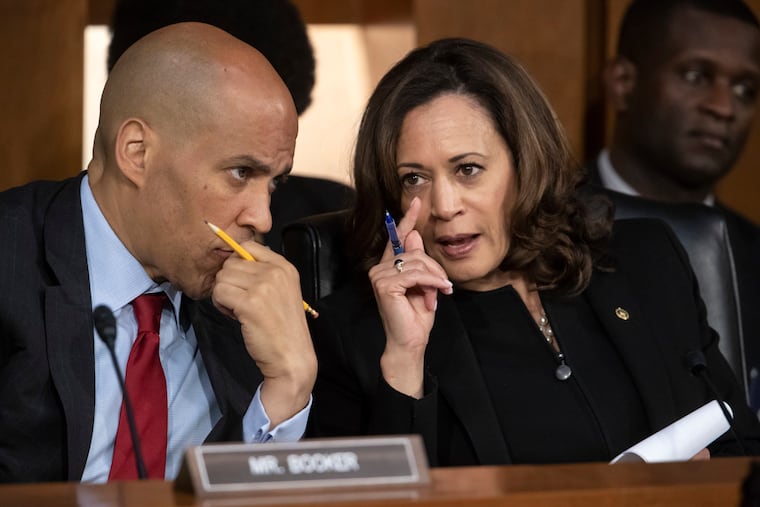Presidential candidates Cory Booker and Kamala Harris side against Comcast in key Supreme Court case
A dozen members of Congress, including presidential candidates Booker and Harris, have filed a brief with the U.S. Supreme Court supporting an African American Hollywood mogul in his civil rights case against Comcast Corp.

A dozen members of Congress, including Democratic presidential candidates Cory Booker and Kamala Harris, have filed a brief with the U.S. Supreme Court supporting an African American Hollywood mogul in his civil rights case against Comcast Corp.
And the Congressional Black Caucus, of which Booker and Harris are members, said in a statement Thursday that it was “deeply disappointed and concerned” with the case because it could “upend” a crucial law meant to root out racial discrimination in contracting.
The lawmakers are among the latest to wade into the contentious case between Comcast and entertainment executive Byron Allen, who claimed in a federal lawsuit in California that Comcast racially discriminated against him when it refused to carry his cable-TV channels on its systems.
The Supreme Court has agreed to hear an appeal. Several legal experts have warned that a favorable ruling for Comcast could make it harder to bring racial-discrimination cases. At issue is whether a person filing a racial discrimination lawsuit must show that race is the “sole” reason a decision was made or whether race was “a motivating factor,” according to legal experts.
The case “has the potential to make it much harder for those facing discrimination to seek legal recourse,” the Congressional Black Caucus said in a statement. “This heightened standard would close the courthouse doors to many litigants and rob them of their opportunity to have their matter heard by the courts.”
Comcast has said race had nothing to do with rejecting Allen’s channels, noting that they had low ratings. The Philadelphia company said the Allen case is merely a business dispute.
In an email, Comcast spokesperson Sena Fitzmaurice said the company is “not seeking to roll back the civil rights laws.”
“We have been forced to appeal this decision to defend against a meritless $20 billion claim, but have kept our argument narrowly focused,” she added. “This case arises from a frivolous discrimination claim that cannot detract from Comcast’s strong civil rights and diversity record or our outstanding record of supporting and fostering diverse programming from African American owned channels.”
In a brief filed with the high court on Monday, the members of Congress, including New Jersey’s Booker and California’s Harris, said the court should reject Comcast’s argument that plaintiffs must show that race was the sole reason a decision was made.
“The statute at issue in this case … was passed immediately after the Civil War as part of a broader effort to ensure that the newly freed slaves enjoyed the same rights as other citizens,” the brief said. “This court should not rewrite Section 1981 and disturb the vital protections that Congress passed that statute to provide.”
Among others who have filed briefs in the case are U.S. Solicitor General Noel Francisco, who sided with Comcast, and more than two dozen civil rights groups, including the NAACP, which backed Allen.